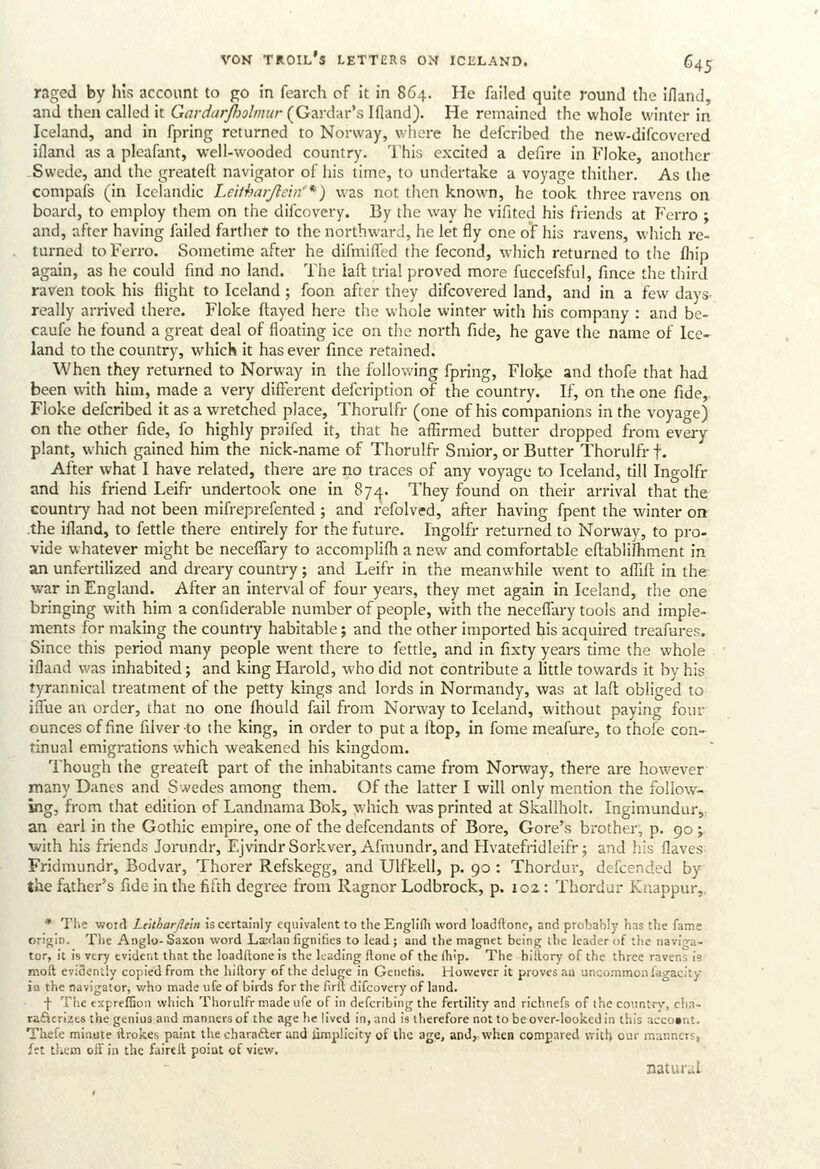
Full resolution (JPEG) - On this page / på denna sida - Pages ...

<< prev. page << föreg. sida << >> nästa sida >> next page >>
Below is the raw OCR text
from the above scanned image.
Do you see an error? Proofread the page now!
Här nedan syns maskintolkade texten från faksimilbilden ovan.
Ser du något fel? Korrekturläs sidan nu!
This page has never been proofread. / Denna sida har aldrig korrekturlästs.
VON TROIL’S LETTERS ON ICELAND, 645
raged by his account to go in fearch of it in 864. He failed quite round the ifland,
and then called it Gardarfholmur (Gardar’s Ifland). He remained the whole winter in
Iceland, and in {pring returned to Norway, where he defcribed the new-difcovered
ifland asa pleafant, well-wooded country. ‘his excited a defire in Floke, another
Swede, and the greateft navigator of his time, to undertake a voyage thither. As the
compafs (in Icelandic Leithar/tein’*) was not then known, he took three ravens on
board, to employ them on the difcovery. By the way he vifited his friends at Ferro ;
and, after having failed farther to the northward, he let fly one of his ravens, which re-
turned to Ferro. Sometime after he difmiffed the fecond, which returned to the {hip
again, as he could find no land. ‘The laft trial proved more fuccefsful, fince the third
raven took his flight to Iceland; foon after they difcovered land, and in a few days.
really arrived there. Floke ftayed here the whole winter with his company : and be-
caufe he found a great deal of floating ice on the north fide, he gave the name of Ice-
land to the country, which it has ever fince retained.
When they returned to Norway in the following fpring, Floke and thofe that had
been with him, made a very different defcription of the country. If, on the one fide,.
Floke defcribed it as a wretched place, Thorulfr (one of his companions in the voyage)
on the other fide, fo highly proifed it, that he affirmed butter dropped from every
plant, which gained him the nick-name of Thorulfr Smior, or Butter Thorulfr +.
After what I have related, there are no traces of any voyage to Iceland, till Ingolfr
and his friend Leifr undertook one in 874. They found on their arrival that the
country had not been mifreprefented ; and refolved, after having fpent the winter on
the ifland, to fettle there entirely for the future. Ingolfr returned to Norway, to pro-
vide whatever might be neceflary to accomplifh a new and comfortable eftablifhment in
an unfertilized and dreary country; and Leifr in the meanwhile went to affift in the
warinEngland. After an interval of four years, they met again in Iceland, the one
bringing with him a confiderable number of people, with the neceflary tools and imple-
ments for making the country habitable; and the other imported his acquired treafures.
Since this period many people went there to fettle, and in fixty years time the whole
ifland was inhabited; and king Harold, who did not contribute a little towards it by his
tyrannical treatment of the petty kings and lords in Normandy, was at laft obliged to
iffue an order, that no one fhould fail from Norway to Iceland, without paying four
ounces of fine filver to the king, in order to put a {top, in fome meafure, to thofe con-
tinual emigrations which weakened his kingdom. r
Though the greateft part of the inhabitants came from Norway, there are however
many Danes and Swedes among them. Of the latter I will only mention the follow-
ing, from that edition of Landnama Bok, which was printed at Skallholt. Ingimundar,,
an earl in the Gothic empire, one of the defcendants of Bore, Gore’s brother, p. 903
with his friends Jorundr, Ejvindr Sorkver, Afmundr, and Hvatefridleifr ; and his flaves
Fridmundr, Bodvar, ‘Thorer Refskegg, and Ulfkell, p. go: Thordur, defcended by
the father’s fide in the fifth degree from Ragnor Lodbrock, p. 102: Thordur Knappur,,
* The word Leitharfein is certainly equivalent to the Englifi word loadftone, and probably has the fame
origin. The Anglo-Saxon word Ledan fignifies to lead; and the magnet being the leader of the naviga-
tor, it is very evident that the loadftone is the leading ftone of the fhip. The hiftory of the three ravens is
moit evidently copied from the hiftory of the deluge in Genetis. However it proves aa uncommon lagacity
ia the navigator, who made ufe of birds for the firft difcovery of land.
+ The expreffion which Thorulfr made ufe of in defcribing the fertility and richnefs of the country, cha-
raftcrizes the genius.and manners of the age he lived in, and is therefore not to be over-lookedin this accoent.
‘Thefe minute itrokes paint the charaéter and jimplicity of the age, and, when compared with our manners,
fet them off in the fairelt point of view.
natural
‘
<< prev. page << föreg. sida << >> nästa sida >> next page >>